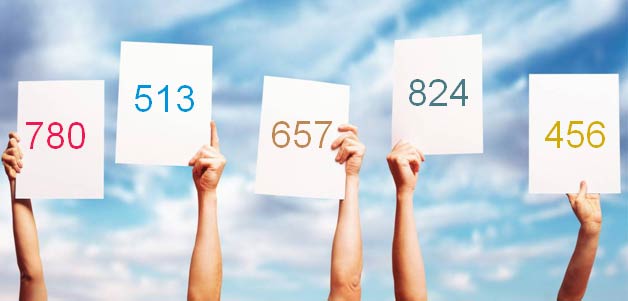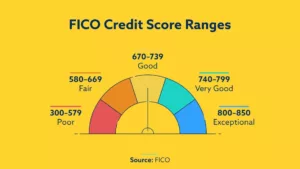There are two different sources where negative credit can be disputed — the creditor and the credit reporting agencies. Both sources require two very different strategies.
Credit scores generated by FICO use a mathematical formula which examines your credit report information and puts it into a 3-digit numerical number ranging from 300 to 850. While it remains a mystery as to exactly what makes up a credit score, we do know 35% of your credit score is determined by payment history.
Late payments are detrimental to your credit score. A single 30-day late payment can lower a FICO score up to 110 points. FICO considers how recent the late payments are, how severe the late payments are, and how frequently the late payments occur. The most recent 2-year late payments are more damaging to FICO score than late payments which occurred a long time ago.
Determining a late payment
According to the FICO scoring system a payment that is 30 days or more past the due date is considered late. For example, if your credit card due date is July 1, 2015 but you pay on July 15, 2015, this is not a late payment according to FICO. The credit card company can charge you a late fee but they cannot report the payment as late to the credit bureaus. However, if your due date is July 1, 2015 but you pay August 3, 2015, the credit card company can report the account to the credit bureaus as a 30-day late.
If you are repairing your credit, correcting and even deleting late payments will help improve your credit scores. Below are several ways to tackle late payments on your credit reports.
How to dispute late payments with the creditor
Goodwill Letter. Infrequent, rare late payments can be deleted by the original creditor. Write a goodwill letter and request the creditor remove the late payment. Many times creditors, as a gesture of good customer service, will remove late payments, especially if you have been a good customer in the past.
Multiple Late Pays. Multiple late payments can actually work in your advantage. If you have an account with 30, 60, 90 and even 120 late payments and it has not been charged off, offer to bring the account current in exchange for deletion of the late payments. You have the leverage which is the money your creditor wants. Their alternative would be to charge-off the account. Why not rehabilitate the account and save your credit score. It never hurts to ask but always get all negotiations in writing! In the event the account is more than 180-days late, the creditor may charge off the account, report it to credit bureaus as a charge off and transfer or sell it to a collection agency.
Proof of Payment. A creditor may agree to delete a late payment if you have proof of a timely payment such as a canceled check. Make your request in writing and it may help if you let them know you are trying to make a big purchase like an automobile or mortgage. Creating an urgency will sometimes get you a positive response.
Identity Theft. Unfortunately identity theft has become a huge problem in today’s Internet savvy world. If you are or have experienced identity theft it may be necessary to obtain police reports and any follow-up information in order to have this information corrected. It may take a little more time to correct these types of errors.
Online Bill Payment. The advent of online bill pay is actually a very good reason for internal investigations with your credit card companies. Online or automatic bill pay can have software glitches or, perhaps the service was offline for maintenance when you attempted your payment. A payment could have been paid one day but credited up to 2 to 4 days later. Dispute “account paid on time” with the credit bureaus but also contact your creditor and explain the issue and politely request they correct the negative entry with the credit bureaus to reflect “paid/never late.” Utilize the Fair Credit Billing Act to dispute directly with the creditor if you have “open end” credit accounts and want to dispute fraudulent or unfair credit charges.
How to dispute late payments with the credit reporting agencies
The “Never Late” Dispute. Disputing a late payment by stating you were never late may result in two different outcomes: (1) the CRA will contact the creditor and get verification to confirm the listing or; (2) the CRA will contact the creditor, the creditor may fail to respond within (30) days which results in the listing being converted to a “positive status.”
The Factual Error Dispute. As an alternative to the “Never Late” dispute look for factual errors you can dispute. Is the account balance, late payment amount, and dates being accurately reported? If not, dispute the errors and request a deletion, not a correction. Are the credit reporting agencies reporting a delinquent amount of zero ($0)? If so, how can you be delinquent for nothing? Request a deletion.
The Charge-Off Dispute. Has the account been charged-off. If so, no late payments should be reporting after an account has been charged-off or closed. This is a factual error you can dispute and request a deletion. Is the date the account was charged-off or closed correct or being reported at all? Are the dates of the late payments correct? Do not give them the correct information, dispute and ask for a deletion of the listing. Dispute the late pays with the credit reporting agencies. If the dispute is verified, try again in 60 days until you get the result you want.
Isolated late payments
If a creditor is using FICO 8 version of credit scoring then an isolated late payment will not be as detrimental to your score under certain conditions. If the late payment is an isolated event and other accounts are in good standing, FICO® Score 8 is more forgiving compared with previous FICO® Score versions. But with a credit report that has numerous late payments, the reverse is true and FICO 8 will likely lose more points.

















